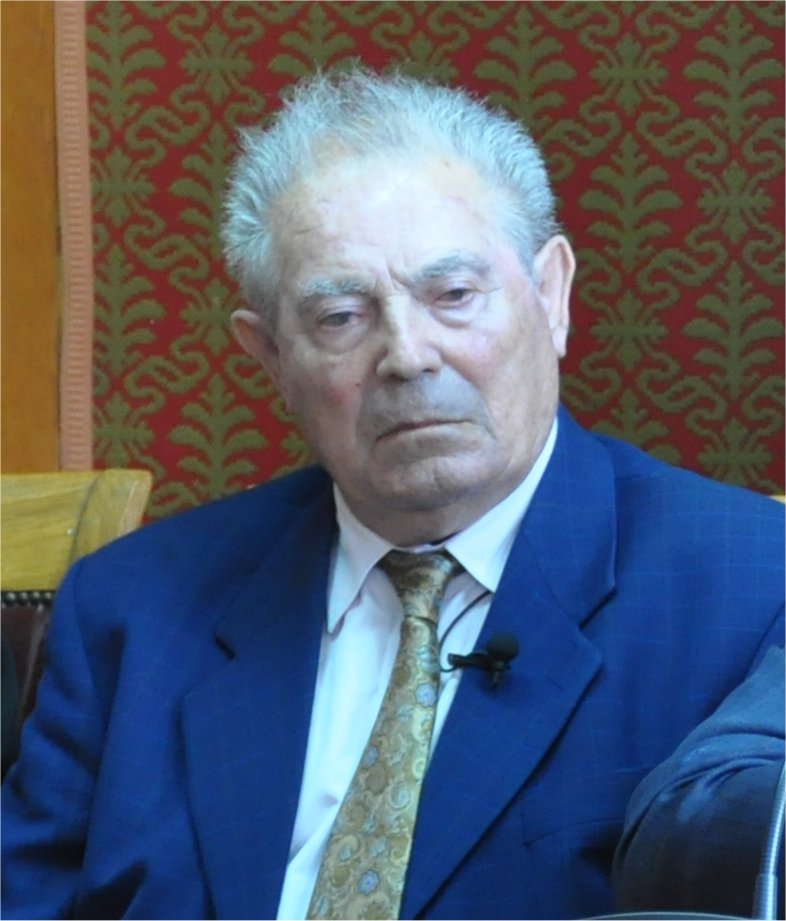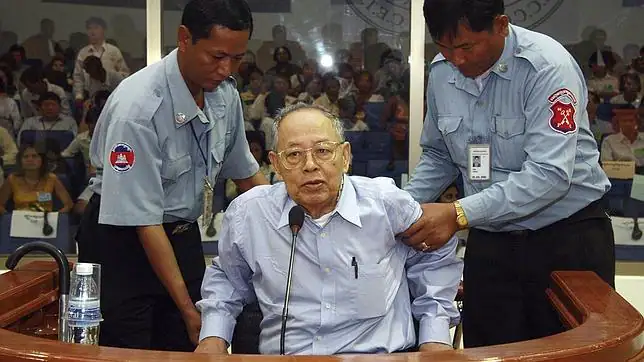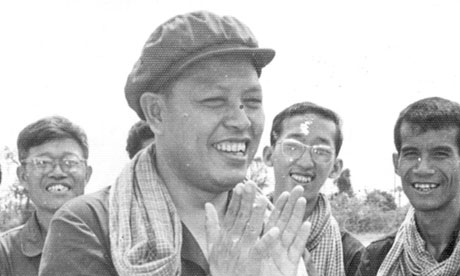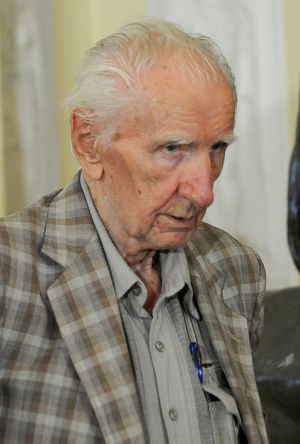Hola amigos:
Ha fallecido el quefue factotum del CNI durante años: el Teniente General Emilio Alonso Manglano. Con él se lleva multitud de secretos:
Emilio Alonso Manglano, director de los servicios secretos españoles de 1981 a 1995, ha fallecido hoy a los 87 años de edad, según han confirmado fuentes del CNI.
El que fuera director de La Casa, anterior Cesid y hoy CNI, presentó su dimisión en 1995 por el escándalo de las conocidas como 'escuchas del Cesid', destapadas por EL MUNDO, donde se grabó de forma ilícita centenares de comunicaciones entre 1983 y 1991 a políticos, empresarios, periodistas e, incluso, al propio Rey Don Juan Carlos.
Manglano recurrió la sentencia de seis meses de arresto y ocho años de inhabilitación ante el Constitucional y finalmente fue exonerado, al haberse retirado las imputaciones contra él.
Nacido el 13 de abril de 1926 en Valencia, ingresó en la Academia General Militar el 24 de julio de 1944, siendo ascendido en los años posteriores hasta llegar a teniente coronel en 1976.
Manglano fue nombrado por el presidente Leopoldo Calvo Sotelo tras el intento de golpe de Estado del 23-F y posteriormente ratificado por el PSOE. Durante su dirección España vivió una de las épocas más convulsas. Su gestión de los últimos años se vio empañada por los casos GAL, Roldán o los fondos reservados.
Los primeros años de Manglano al frente del Cesid se centraron, según describe el CNI en su página web, en "obtener, evaluar, interpretar y facilitar al titular del Departamento de Defensa cuanta información fuera necesaria o interesara a la Defensa Nacional y que ayudaran a prevenir amenazas involucionistas, desestabilizaciones constitucionales y acciones de espionaje".
La "Defensa Nacional" se convertía así en el eje de la labor de un Servicio que iba creciendo con el tiempo en medios e instalaciones.
En suma, los trabajos del Cesid en los primeros años de dirección del General Alonso Manglano se dirigieron fundamentalmente a colaborar en el proceso de constitucionalización de las Fuerzas Armadas.
En esos años 80 se dan varios hitos en la historia del Servicio de Inteligencia español, no todos positivos.
El Cesid inicia con Manglano su apertura al exterior, comienza a conocer la organización de otros Servicios de Inteligencia y establece con ellos relaciones institucionales que fructificarán con una cooperación permanente en un mundo dominado por la guerra fría.
Su atención se centra principalmente en la estabilidad del Mediterráneo, y su especialización en este área geoestratégica le transforma en el mejor especialista en inteligencia del Norte de África y Oriente Medio.
(El Mundo)
También ha fallecido Sabawi Ibrahim al-Hassan, medio hermanod de Saddam Hussein y jefe de sus servicios secretos. Lamentablemente ha sido de cáncer.
Saddam Hussein’s half-brother and former director of his feared general security services died of cancer Monday in a Baghdad hospital, a senior official said.
Deputy Justice Minister Busho Ibrahim told The Associated Press that Sabawi Ibrahim al-Hassan, who had received several death sentences, was transferred to the hospital from prison as his health deteriorated at dawn. His body will be handed over to his family.
Al-Hassan had lived in exile for a period after the 2003 U.S.-led invasion, but he was deported to Iraq by the Syrian government in 2005. He was No. 36 on the list of 55 most-wanted Iraqis released by U.S. authorities and was suspected of financing insurgents after U.S. troops ousted the ex-dictator.
Under Saddam, al-Hassan served as head of intelligence and security before taking up his final post of presidential adviser to the former regime. Saddam Hussein was executed by hanging in December 2006 for his role in the 1982 killings of 148 Shiites following a failed assassination attempt in the early 1980s.
(Navy Times)
También ha fallecido la rusa Nadezhda Popova. Piloto de combate durante "La Gran Guerra Patriótica"
Unlike Soviet men, women were not formally conscripted into the armed forces. They were volunteers. But the haemorrhaging of the Red Army after the routs of 1941 saw mass campaigns to induct women into the military. They were to play an essential role. More than 8,000 women fought in the charnel house of Stalingrad.
In late 1941 Stalin signed an order to establish three all-women Air Force units to be grouped into separate fighter, dive bomber and night bomber regiments. Over the next four years these regiments flew a combined total of more than 30,000 combat sorties and dropped 23,000 tons of bombs. Nadezhda Popova, then aged 19, was one of the first to join the best-known of the three units, the 588th Night Bomber Regiment (later renamed the 46th Taman Guards Night Bomber Aviation Regiment).
The 588th was not well equipped. Wearing hand-me-down uniforms from male pilots, the women flew 1920s-vintage Polikarpov PO-2 two-seater biplanes, which consisted of fabric strung over a plywood frame, and lacked all but the most rudimentary instruments.
There was no radio; navigation was done with a stopwatch and a map. The planes carried no guns, no parachutes and had only enough weight allowance to take two bombs, forcing the pilots to make multiple sorties (Nadezhda Popova once flew 18 in a single night), returning to base each time to collect more bombs, which were released with a wire cable jury-rigged to the wings.
Because they were so vulnerable, the 588th flew only at night, and was mainly involved in harassment bombing of German military encampments, rear area bases and supply depots. The strategic importance of the targets was seldom high, but the psychological effect of the raids was considerable.
Because the PO-2s were flimsy and flew near the ground, they could often pass undetected by radar. The pilots’ tactic was to fly to within a certain distance of the target, and cut their engines. They would then glide in silently, release their bombs, then restart their engines and fly home. The Germans called them the “Nachthexen” (the Night Witches) due to the whooshing sound they made — “like a witch’s broomstick in the night’’ — as they flew past. There was, supposedly, a promise to award an Iron Cross to any Luftwaffe pilot who actually managed to bring down a Night Witch.
To escape the German ground defences, the 588th flew in formations of three. Two would go in as decoys to attract the attention of the searchlights, then separate in opposite directions and twist and turn wildly to avoid the flak guns. As the searchlights scrambled to follow them, the third bomber would sneak in along the darkened path made by her two comrades and hit the target unopposed. She would then get out and rejoin the other two; they would then switch places until all three had delivered their payloads. It took nerves of steel to be a decoy, but as Nadezhda Popova recalled: “It worked.”
It was the cold that she recalled more than anything else: “When the wind was strong it would toss the plane. In winter when you’d look out to see your target better, you got frostbite, our feet froze in our boots, but we carried on flying.” There was no time for fear: “You had to focus on the target and think how you could hit it. There was no time to give way to emotions... Those who gave in were gunned down and they were burned alive in their craft as they had no parachutes.”
She recalled one particularly gruelling mission when, after bombing an ammunition dump, she found herself caught in the searchlights: “I manoeuvred and suddenly I saw them switch to another plane that flew after me. Enemy planes took off and shot it down, it caught fire and fell. That was one. Then I turned my head and saw a second plane go down in flames and then a third one lit up the sky like a falling torch. By the time I got back, four of our planes had perished with eight girls in them burned alive ... What a nightmare, poor girls, my friends, only yesterday we had slept in the bunks together.”
Nadezhda Popova, who was promoted to the rank of lieutenant-colonel, was one of the best of the 588th pilots — and one of the luckiest. She flew 852 missions, serving in Ukraine, Rostov-on-Don, the North Caucasus near Grozny, Novorossiysk, Sevastopol, Minsk, Warsaw and Berlin. Though shot down or forced to land several times, she always emerged unharmed — and on one occasion she found romance too.
Shot down in July 1942 in the North Caucasus, she joined a retreating infantry column and, on the way back to her unit, met another pilot, Semyon Kharlamov, who had also been shot down. Only his eyes were visible through his bandages, but he charmed her with his jokes. They met a number of times again during the war and became Heroes of the Soviet Union by the same decree in February 1945. When they reached Berlin at the end of the war, they scribbled their names together on the walls of the Reichstag.
Shortly afterwards they married and remained together until Semyon’s death in 1990.
The daughter of a railwayman, Nadezhda Popova was born in Shabanovka (now Dolgoye) on December 17 1921 and brought up in Donetsk in Ukraine.
She decided to train as a pilot as a young girl when a small plane landed near her house and the pilot got out: “I thought, 'Oh my God! He’s just an ordinary man!’ We touched the wings of the plane and his leather jacket... and I had thought that they were some Hercules. And then I thought it would be great if I could fly like a bird.”
When she was 15 she joined a flying club, and in 1937, aged 16, made her first parachute jump and her first solo flight. She went on to train at the aviation school at Kherson, Ukraine, and became a flying instructor.
She decided to volunteer as a bomber pilot after her home was taken over by the invading Germans and her brother, Leonid, was killed at the front: “He was 20 and had never even kissed a girl,” she recalled. “My mother sobbed, 'That damn Hitler.’ I saw the German aircraft flying along our roads filled with people who were leaving their homes, firing at them with their machine guns... they blasted our school.”
After the war she returned to her work as a flying instructor.
In addition to her other decorations, she was awarded the Soviet Medal of Honour; the Order of Friendship; the Order of Lenin; and the Order of the Red Banner (three times).
She is survived by her son, now a general in the Belarussian Air Force.
Nadezhda Popova, born December 17 1921, died July 8 2013
(Daily Telegraph)
Descansen en Paz.
Hasta otra. ><>


















